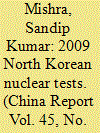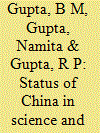| Srl | Item |
| 1 |
ID:
102765


|
|
|
| 2 |
ID:
102762


|
|
|
|
|
| Publication |
2011.
|
| Summary/Abstract |
apan and China's expanding global outreach is not entirely the result of their growing reliance on imported oil and their efforts to secure supplies globally. Rather, it is consistent with both countries' overall economic growth and enhanced political standing. The build-up of closer ties with the developing world, and China and Japan's growing presence should be seen in the context of Beijing and Tokyo's expanding economic interests world-wide and growing international political influence, not simply as a symptom of their pursuit for energy. In short, energy has influenced Chinese and Japanese international behaviour but not transformed their foreign policy. This article presents the argument that while energy is an important factor in Japanese and Chinese foreign policy, the impact of their energy needs on their international behaviour is only one dimension, and must be analysed in the context of their multiple and competing policy priorities. A better understanding of the impact of energy on Chinese and Japanese foreign policy requires a more comprehensive approach with an in-depth examination of their interactions over energy related matters with other countries. This article is an effort in addressing the role of energy in the wider context of Japanese and Chinese foreign policy in the Central Asia region from a comparative perspective.
|
|
|
|
|
|
|
|
|
|
|
|
|
|
|
|
| 3 |
ID:
102763


|
|
|
|
|
| Publication |
2011.
|
| Summary/Abstract |
The current global economic meltdown offers historic opportunities for China and India to catapult their respective positions in the international system. The increasing recognition of their roles in global academic debates, and more recently by the G20 summits, remain both the cause as also the consequence of their expanding mutual economic engagements. However, their border trade has fallen drastically from $ 52 billion for 2008 to $ 43 billion for 2009. This is result of their expanding trade deficit, abysmally low mutual investments, lacklustre border trade and stagnant border negotiations, all allude to their lack of appreciation of the systemic bottleneck threatening to undermine this most reliable pillar of their rapprochement. This calls for deeper and urgent examination of the structural bottlenecks so as to ensure their continued robust economic engagement which is essential if China and India have to play a pivotal role in regional and global economic stabilisation and upturn. Such an outcome remains intertwined with their own peaceful rise as major stakeholders of the rapidly transforming international system.
|
|
|
|
|
|
|
|
|
|
|
|
|
|
|
|
| 4 |
ID:
102764


|
|
|
|
|
| Publication |
2011.
|
| Summary/Abstract |
The study examines China's performance in science and technology (S&T) during 1997-2007, based on several parameters including the country's annual average growth rate, global publication share and rank, strong and weak subject areas (in terms of national priority, international collaborative share and global share), institutional profiles of select top institutions, the overall international collaboration profile and major collaborative partners, patterns of communication in national and international journals and characteristics of its top highly cited papers. The study also compares similarities of China's research profile with nineteen other top productive countries.
|
|
|
|
|
|
|
|
|
|
|
|
|
|
|
|